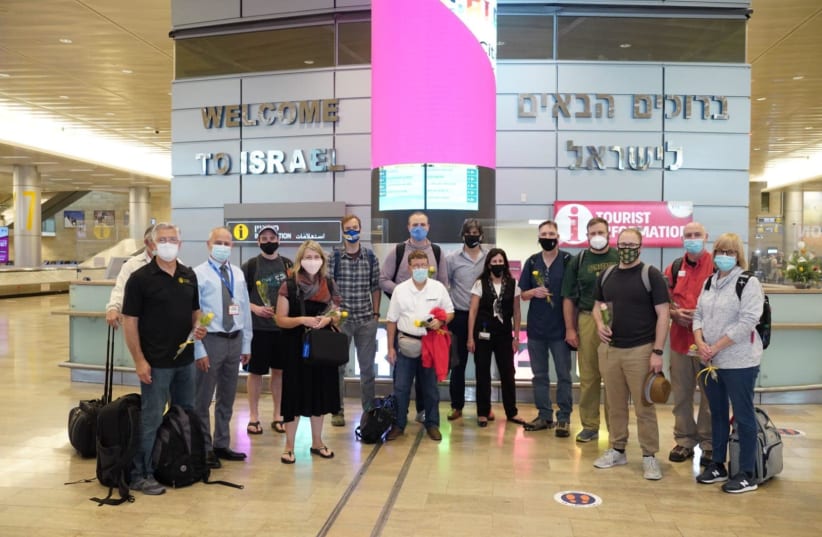The first group of tourists to visit Israel since March 2020 arrived at Ben-Gurion Airport Thursday, under Israel’s new framework for reopening the tourism industry.
The group consists of 12 students at the Concordia Seminary in Missouri who are Christian pilgrims led by Pastor Tom Zelt from the Prince of Peace Church. All are vaccinated, as per Health Ministry requirements, and have arrived as part of their study program.
Additional groups will arrive during the next two weeks.
“Israel is healthy and vaccinated,” Tourism Minister Orit Farkash-Hacohen told them at the airport. “Restaurants, hotels, concerts, markets and sporting venues: everything is open.”
“You are the first organized tourist group to visit Israel in over a year,” Farkash-Hacohen said, expressing her hope that they were the sign of many more to come. “Israel is an attractive destination, with unparalleled historic and religious sites sacred to three religions, vibrant cities, amazing food and warm people. I am sure you will enjoy it all.”
Upon their arrival at the terminal, the tourists were greeted by Tourism Ministry representatives, who presented them with flowers and escorted them through the routine immigration and PCR tests mandated by Israeli law for all incoming passengers.
The Tourism Ministry is pursuing a graduated timeline for welcoming inbound tourism. Thursday’s group is one of 20 that will be allowed into Israel for a pilot program, in which the ministry will closely monitor their compliance with COVID-19 regulations, including tracking their movements.
If that pilot is successful, the doors will be opened for more tour groups to visit. If all goes well, individual travelers could be allowed to start visiting on their own starting July 1.
Earlier this month the Tourism Ministry invited tour operators to apply to be one of the first 20 to bring in a group. The quota was filled within nine minutes, leaving others on a waiting list in case a group dropped out.
When the application went live, “I kept refreshing the page to get through as if I was trying to buy tickets for a big rock concert,” said Adi Aharoni, CEO of Israel Experts, the tour operator managing the trip. “The group had arranged its tour before the pandemic, and they were getting ready for the possibility of finding out about a date at the last minute. The group was originally supposed to be 17 people, but some dropped out when we finalized the date, so we came down to 12.”
While Aharoni said he was excited to welcome the group to Israel, he also said the bureaucracy of making it happen was extremely difficult.
“The pastor is a big Zionist, so he was patient, but for someone less motivated, the paperwork would have been somewhere between challenging and impossible,” he said. “The Health Ministry will need to change the directives if it wants to allow tourism to recover. I understand the need to protect Israelis from coronavirus, but hundreds of thousands of Israeli are traveling abroad also, and they are no less likely to bring in a variant than non-Israelis.
The group that arrived Thursday will be in Israel until June 10. Zelt is a frequent visitor to Israel, having led several groups a year before the pandemic. He also trains other pastors to become tour leaders in Israel for their own communities.
All visitors must be inoculated with a Health Ministry-approved vaccine and come only from countries that meet its requirements. In addition, tourists participating in the pilot must show two PCR tests – one up to 72 hours before entering Israel, and one upon arrival. The pilot program will continue through June 15.
The pilot plan for groups does not include educational tours such as Taglit-Birthright groups, which are approved through a separate mechanism in a different government ministry.
